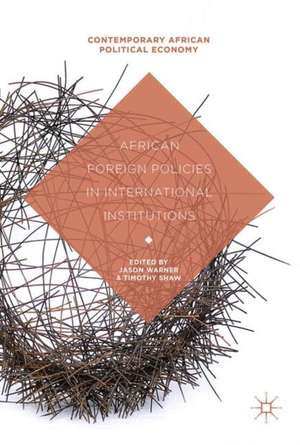African Foreign Policies in International Institutions: Contemporary African Political Economy
Editat de Jason Warner, Timothy M. Shawen Limba Engleză Hardback – 19 mai 2018
| Toate formatele și edițiile | Preț | Express |
|---|---|---|
| Paperback (1) | 588.37 lei 6-8 săpt. | |
| Palgrave Macmillan US – 25 iul 2019 | 588.37 lei 6-8 săpt. | |
| Hardback (1) | 736.32 lei 6-8 săpt. | |
| Palgrave Macmillan US – 19 mai 2018 | 736.32 lei 6-8 săpt. |
Preț: 736.32 lei
Preț vechi: 897.95 lei
-18% Nou
Puncte Express: 1104
Preț estimativ în valută:
140.89€ • 147.10$ • 116.61£
140.89€ • 147.10$ • 116.61£
Carte tipărită la comandă
Livrare economică 04-18 aprilie
Preluare comenzi: 021 569.72.76
Specificații
ISBN-13: 9781137575739
ISBN-10: 1137575735
Pagini: 497
Ilustrații: XXIV, 430 p. 3 illus.
Dimensiuni: 148 x 210 x 35 mm
Greutate: 0.69 kg
Ediția:1st ed. 2018
Editura: Palgrave Macmillan US
Colecția Palgrave Macmillan
Seria Contemporary African Political Economy
Locul publicării:New York, United States
ISBN-10: 1137575735
Pagini: 497
Ilustrații: XXIV, 430 p. 3 illus.
Dimensiuni: 148 x 210 x 35 mm
Greutate: 0.69 kg
Ediția:1st ed. 2018
Editura: Palgrave Macmillan US
Colecția Palgrave Macmillan
Seria Contemporary African Political Economy
Locul publicării:New York, United States
Cuprins
1. Introduction - Africa Foreign Policies and International Organizations:The View from the 21st Century.- 2. An Ambivalence to the Norm-Cycle: The African Union's "New" Approach to Continental Peace and Security.- 3. The AU and Continental Foreign Economic Policy Making in Africa: Institutions and Dialectics on Integration in the Global Economy.- 4. The Troubled Socialising Agent: Democratic Governance and the African Union’s Quest to Become an Independent Foreign Policy Actor.- 5. Beyond the Collective: Comparative Strategic Utility of the African Union and the RECs in Pursuing Individual National Security Foreign Policy Goals.- 6. The Role of African Regional Organizations in Post-Election Governments of National Unity.- 7. Nationalism Underpinned by Pan-Regionalism: African Foreign Policies in ECOWAS in Era of Anti-Globalization.- 8. The Intergovernmental Authority on Development: Internal Culture of Foreign Policymaking and Sources of Weaknesses.- 9. The Uses (and Abuses) of the Economic Community of Central African States: The Hidden Functions of Regional Economic Community Membership for African Regimes.- 10. The Instrumentalization of SADC to Achieve Foreign Policy Agendas.- 11. Partnering for Peace: United Nations and African Union Collaboration in Peace and Security.- 12. South Africa's Foreign Policy and the International Criminal Court: Of African Lessons, Security Council Reform, and Possiblities for an Improved ICC.- 13. The International Labor Organization and African States: Internationalizing States and Dispersed Foreign Policy.- 14. African Agency and the World Bank in the 21st Century.- 15. Global Humanitarian Organizations and African Goals: The Case of MSF in South Africa.- 16. Consistency in Inconsistency: South Africa’s Foreign Policies in International Organizations.- 17. Leverage in a Tight Space: Zimbabwean Foreign Policy in International Organizations.- 18. Angola’sMeasured Distance from International Organizations.- 19. Decolonizing Intenational Relations: Insights From the International Financial Institutions in the Congo During the Cold War.- 20. Nigeria’s Foreign Policy in Relation to the Economic Community of West African States (ECOWAS).- 21. Senegalese Foreign Policy and International Institutions: Leadership Through Soft Power from Senghor to Sall.- 22. Don’t think Cameroon is Timid in International Organizations(ios), it is only a Strategic Approach for achieving its Foreign Policy Goals in Foreign Relations.- 23. Regional Powers, Great Power Allies, and International Institutions: The Case of Ethiopia.- 24. Djiboutian’s Foreign Policy in International Institutions: Small State, Big Diplomacy.- 25. Conclusion – African Foreign Policies, International Institutions, and the Future of Global Governance.
Notă biografică
Jason Warner is Assistant Professor at the U.S. Military Academy, West Point, New York, and an Associate of the Combating Terrorism Center, where he serves as director of the Africa research profile. His research interests include African international relations, international organizations, and security issues in Africa. Timothy M. Shaw is Visiting Professor in PhD in Global Governance and Human Security at the University of Massachusetts, Boston, USA, and Emeritus Professor at the University of London, UK. He has edited the International Political Economy series for Palgrave Macmillan for more than 35 years.
Textul de pe ultima copertă
This book is the first to exclusively consider the foreign policy tendencies of African states in international institutions. As an edited volume offering empirically based perspectives from a variety of scholars, this project disabuses the notion that Africa should be considered a "niche" interest in the field of foreign policy analysis. It asserts that the actions of the continent's states collectively serve as an important heuristic by which to interrogate and understand the foreign policies of other global states, and are not simply "anomalously" extant entities whose actions should be studied only insofar as they deviate from predictions based on the experiences of Western or other non-African states.
Caracteristici
Generates conversations in the fields of postcolonial international relations; political, economic, and security studies; as well as informing the fields of foreign policy analysis and the study of international organizations.












